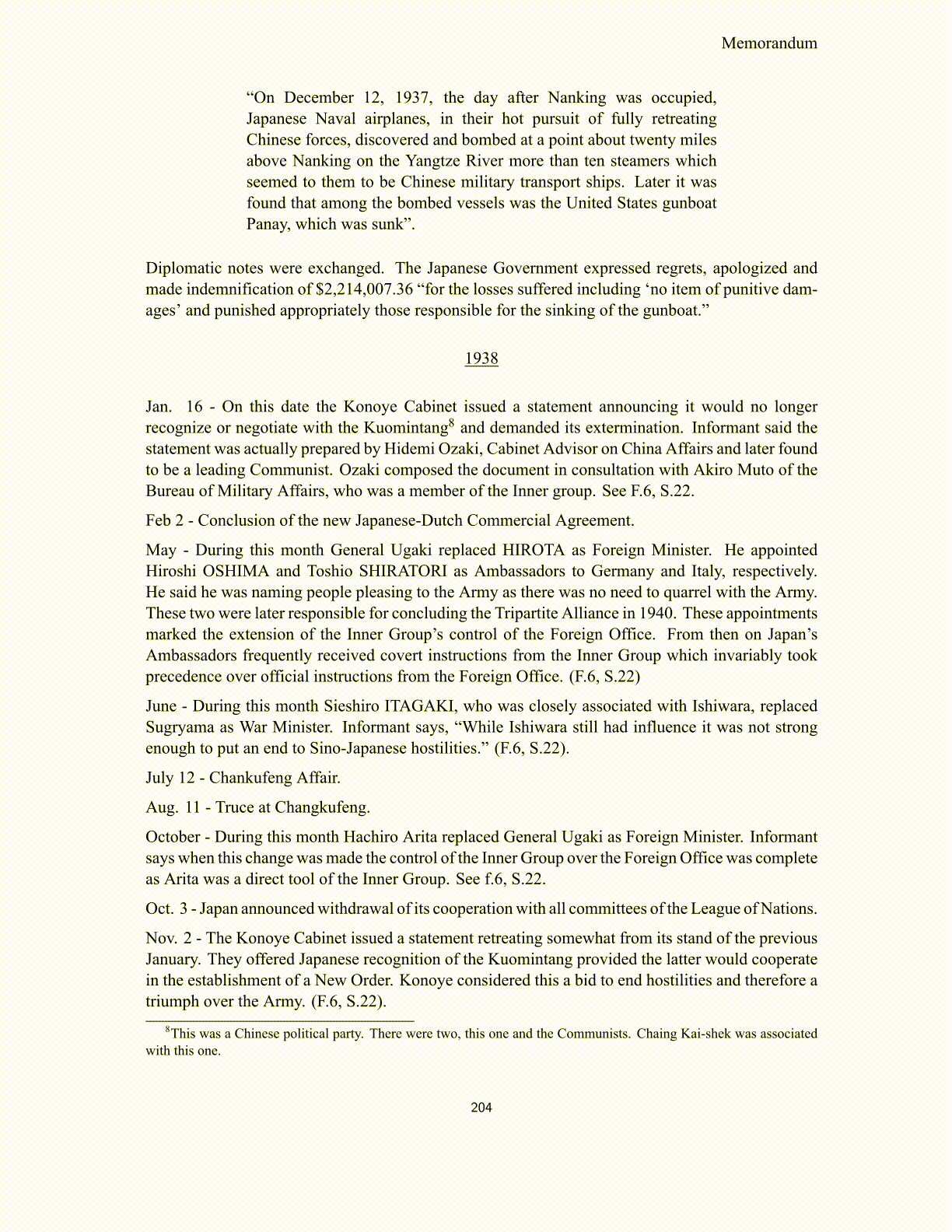
Memorandum “On December 12, 1937, the day after Nanking was occupied, Japanese Naval airplanes, in their hot pursuit of fully retreating Chinese forces, discovered and bombed at a point about twenty miles above Nanking on the Yangtze River more than ten steamers which seemed to them to be Chinese military transport ships. Later it was found that among the bombed vessels was the United States gunboat Panay, which was sunk”. Diplomatic notes were exchanged. The Japanese Government expressed regrets, apologized and made indemnification of $2,214,007.36 “for the losses suffered including ‘no item of punitive dam- ages’ and punished appropriately those responsible for the sinking of the gunboat.” 1938 Jan. 16 - On this date the Konoye Cabinet issued a statement announcing it would no longer recognize or negotiate with the Kuomintang 8 and demanded its extermination. Informant said the statement was actually prepared by Hidemi Ozaki, Cabinet Advisor on China Affairs and later found to be a leading Communist. Ozaki composed the document in consultation with Akiro Muto of the Bureau of Military Affairs, who was a member of the Inner group. See F.6, S.22. Feb 2 - Conclusion of the new Japanese-Dutch Commercial Agreement. May - During this month General Ugaki replaced HIROTA as Foreign Minister. He appointed Hiroshi OSHIMA and Toshio SHIRATORI as Ambassadors to Germany and Italy, respectively. He said he was naming people pleasing to the Army as there was no need to quarrel with the Army. These two were later responsible for concluding the Tripartite Alliance in 1940. These appointments marked the extension of the Inner Group’s control of the Foreign Office. From then on Japan’s Ambassadors frequently received covert instructions from the Inner Group which invariably took precedence over official instructions from the Foreign Office. (F.6, S.22) June - During this month Sieshiro ITAGAKI, who was closely associated with Ishiwara, replaced Sugryama as War Minister. Informant says, “While Ishiwara still had influence it was not strong enough to put an end to Sino-Japanese hostilities.” (F.6, S.22). July 12 - Chankufeng Affair. Aug. 11 - Truce at Changkufeng. October - During this month Hachiro Arita replaced General Ugaki as Foreign Minister. Informant says when this change was made the control of the Inner Group over the Foreign Office was complete as Arita was a direct tool of the Inner Group. See f.6, S.22. Oct. 3 - Japan announced withdrawal of its cooperation with all committees of the League of Nations. Nov. 2 - The Konoye Cabinet issued a statement retreating somewhat from its stand of the previous January. They offered Japanese recognition of the Kuomintang provided the latter would cooperate in the establishment of a New Order. Konoye considered this a bid to end hostilities and therefore a triumph over the Army. (F.6, S.22). 8 This was a Chinese political party. There were two, this one and the Communists. Chaing Kai-shek was associated with this one. 204